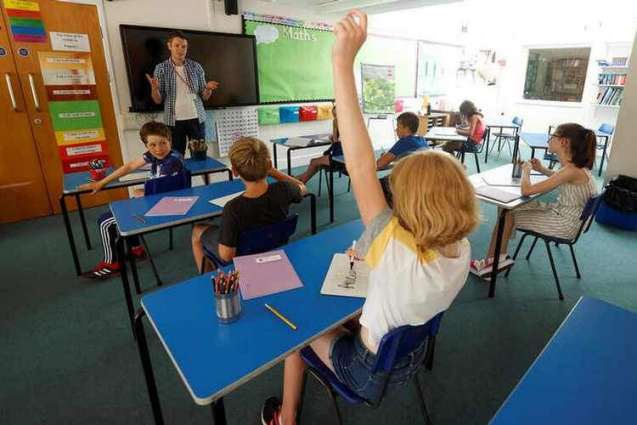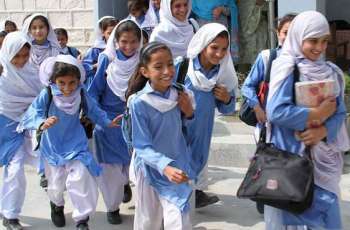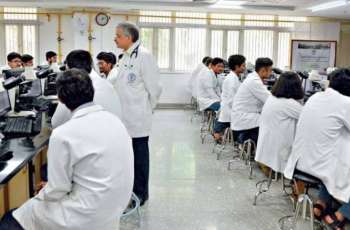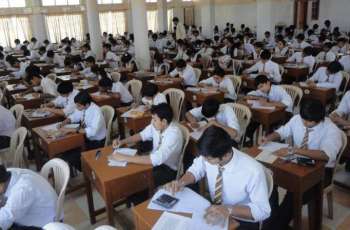OSCOW, September 1 (Sputnik), Valentina Shvartsman - Children are returning back to classrooms for the first time in months as school gradually reopen in Europe amid safety concerns and fear of the second wave of the novel coronavirus infection
MOSCOW (Pakistan Point News / Sputnik - 01st September, 2020) OSCOW, September 1 (Sputnik), Valentina Shvartsman - Children are returning back to classrooms for the first time in months as school gradually reopen in Europe amid safety concerns and fear of the second wave of the novel coronavirus infection.
Lately, COVID-19 cases have been on the rise across the world fueling fears of the second wave of the pandemic, with some countries in Europe seeing record high post-lockdown figures. The global tally meanwhile surpassed 25 million cases and 846,000 deaths, according to data from the Johns Hopkins Coronavirus Resource Center.
WHAT DOES WORLD HEALTH ORGANIZATION SAY?
According to the World Health Organization (WHO), children are less often reported as COVID-19 cases and tend to develop the milder illness, but there are still children who developed severe symptoms or even died from the disease. At the same time, studies indicate that infection rates are higher in teenagers than in younger children.
"When we think about schools we look at all of this evidence that we have on kids and adolescents. We look at hos schools operate and where schools are because, as we have said repeatedly, schools do not operate in isolations, schools are part of communities. So if the transmission is occurring in the communities, transmission can happen in schools and it can happen in other settings that are within that community," Maria Van Kerkhove, the technical lead for COVID-19 at WHO, told a briefing on Thursday.
"So we worry about the children themselves, but we also are concerned about the adults and the other people that work in schools," she noted.
The UN health agency's Q&A on schools and COVID-19 recommends a set of prevention and control measures, which include the screening of students on arrival, adoption a "staying home if unwell" policy, catching up on vaccination, offering distance learning options, physical distancing, and, naturally, hand hygiene. However, data from WHO and UNICEF show that two in five schools, or 43 percent, lack access to adequate handwashing, while in the least developed countries the number reaches as much as seven out of ten schools.
On the issue of wearing masks, WHO advises authorities to base decisions on the risk assessment of levels of transmission in communities, the ability of schools to ensure physical distancing of at least one meter, as well as underlying conditions in students and staff.
HOW COUNTRIES PREPARE FOR REOPENING SCHOOLS?
Denmark was one of the first countries to reopen its schools back in April. In a bid to suppress transmission and keep a distance of 2 meters between children, authorities divided pupils into groups of 12, promoted hand hygiene and holding classes outdoors.
But not all European countries, who will open schools for the first time this week, have similarly rigorous approaches to wearing masks and physical distancing. Poland, for example, will not require students to wear masks at schools at all, while allowing schools to decide individually whether to make wearing masks mandatory in school halls and locker rooms.
On the contrary, France has updated its public health rules instructing pupils above 11 and staff to wear masks in school buildings and playgrounds, while imposed no restrictions on class sizes and made physical distancing recommended instead of mandatory. In Switzerland, only older children are required to wear masks. In Germany, where some schools reopened earlier in August, wearing masks and physical distancing are compulsory. Spain will require all students aged six and over to wear masks in schools and on school transport, even in situations when physical distancing of 1.5 meters is respected. Greece also made face masks mandatory for children at schools.
However, even despite stringent measures, schools still may be forced to return to distance learning throughout the academic year as it happened in South Korea. The Asian country, which has successfully managed the first wave on infections in spring, had its schools switch back to online formats last week due to a spike in COVID-19 cases.




